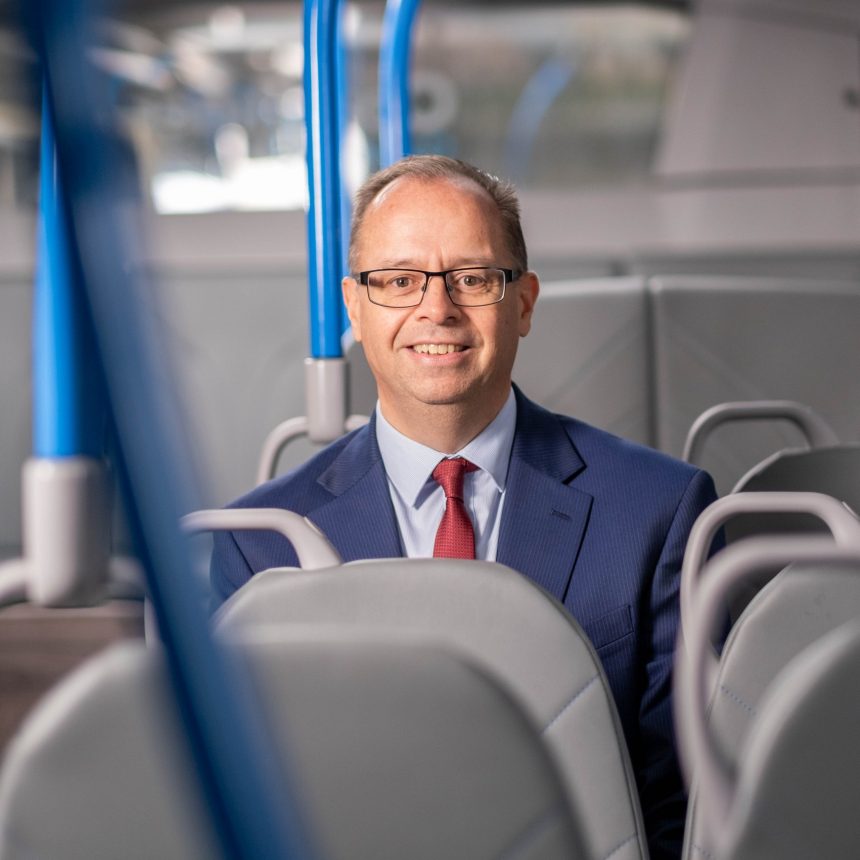With a 37-year career in the industry, Marc Reddy has wide experience of running successful bus operations. Throughout his managerial career, one discipline has remained prominent, a discipline that, in his relatively new role as Managing Director of Stagecoach South, is continuing to deliver results
So just what do you do when, having successfully bid for ZEBRA funding in one part of the country, you change jobs, and in submitting a new bid, in the same part of the country, that bid finds itself towards the bottom of the pile? Marc Reddy is no stranger to the challenges of the bus industry. But even he was surprised by what happened.
“As Managing Director of First Hampshire, Dorset and Berkshire I’d been delighted when our ZEBRA bid to introduce an EV fleet across Portsmouth was successful,” he says. “Moving to Stagecoach South in July 2023, and in line with Stagecoach’s decarbonisation strategy, we submitted ZEBRA bids for our Basingstoke and Portsmouth depots. But because Hampshire County Council and Portsmouth City Council had done well in ZEBRA 1, those locations were now towards the bottom of the Department for Transport bidding criteria list!”
In an industry where the move to deliver EV enhancements often seems to overshadow everything else, Marc could have regarded this as a setback. But that would be to misunderstand Marc’s long established and career-defining approach to delivering successful public transport operations.
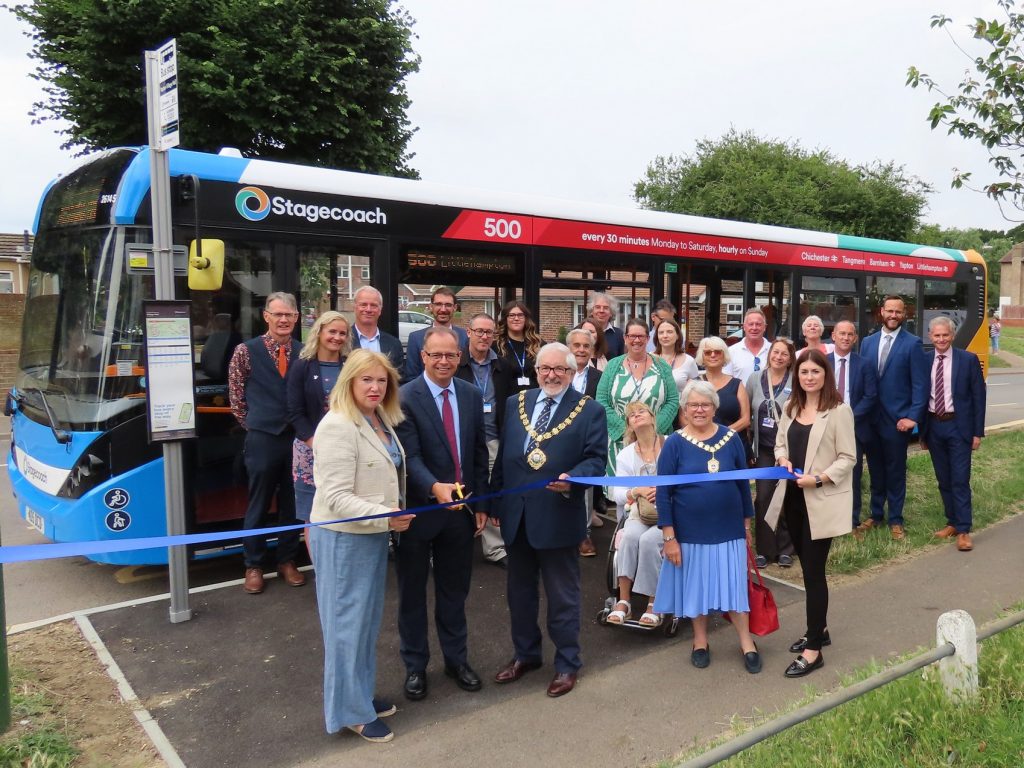
Staff engagement
“Let’s be clear, Stagecoach’s decarbonisation strategy is front and centre, and rightly so,” notes Mark. “But we also have a fast and flexible decision making process too! With the Stagecoach South area serving Hampshire, Portsmouth, Surrey and West Sussex, with routes extending into West Berkshire, Wiltshire and along to Brighton, I have a real mix of market town, city and interurban operation across 450 buses and 1,500 people. There is no one-size-fits-all for this. I have eight depots, the largest being Portsmouth with 85 buses, the smallest being Andover with just 30. That means our depot leadership teams can really engage with our people. Our most recent survey in Portsmouth revealed that a healthy 94% of our staff feel we treat them with respect. I want to get that to 100% but it’s a good start. But what this shows is that each part of the Stagecoach South patch is different. Noting that, I have always recognized that the route to success is through partnerships.”
Fresh challenges
From being a part-time bus conductor with Badger Vectis, a short-lived venture between Badgerline and Southern Vectis in 1987, through an IT role with Yellow Buses in Bournemouth, to a 22-year period in a variety of roles with First Bus across the south and south west of England (and Wales), Marc’s experience has seen him thrive in what has undoubtedly been a challenging time for the industry. Those 22 years included a year heading up Aircoach in Dublin and holding the position of ‘Chief Transformation Officer’ across First Bus. In October 2022 he was appointed Bid Director with First, successfully winning Transport for Greater Manchester’s ‘Rochdale A’ and ‘Rochdale B’ franchises for the nascent Bee Network.
Then, in July 2023, he joined Stagecoach.
“I did wonder how I might feel after all those years with First,” he says. “But you know what, 18 months on and I love it. I know the area so well, but there are fresh challenges. I took over as Managing Director from Edward Hodgson who had done some remarkable work. That led us to winning ‘Bus Operator of the Year’ at the 2023 National Transport Awards, and more recently our Portsmouth depot was announced as Transport Focus’ ‘Best Bus Depot’ with regards to customer satisfaction at 91%.”
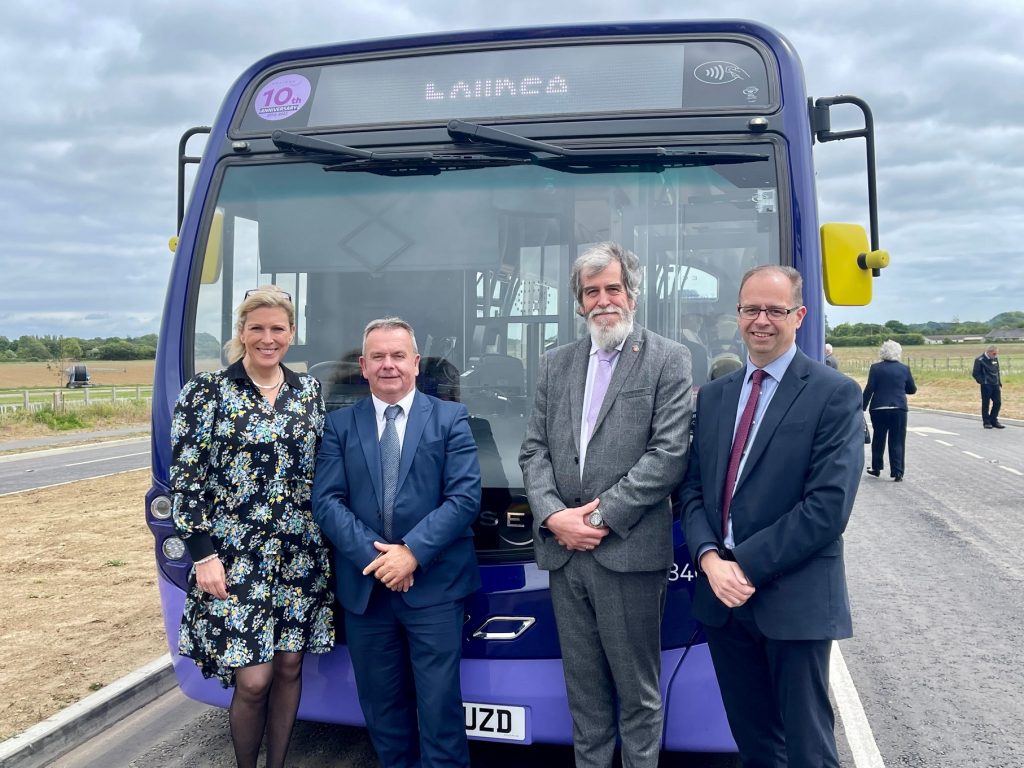
The success of ‘Eclipse’
But it wouldn’t be right to skip over Marc’s time with First without mentioning the South East Hampshire Bus Rapid Transit scheme, perhaps better known as the Eclipse Busway, a 3.4 kilometres busway that operates between Gosport and Fareham in Hampshire.
“This is the biggest success of my career to date,” he explains. “It was delivered in partnership with Hampshire County Council with a very clear, joint objective, to grow bus usage and at the same time help reduce congestion on the parallel A32 between the towns. It’s not a guided busway but the vehicles are high specification. What pleases me the most is that we saw 64% passenger growth in the first year, a 20% modal shift from car to bus, and a not insignificant 2% reduction in traffic on the A32. The scheme was subsequently extended in early 2022 with a further kilometre of busway.”
Political support
But with a new government, and new Members of Parliament taking their seats across the country, is the political landscape changing? Are partnerships as effective as before?
“We have four main local authorities that we engage with,” says Marc. “We have Portsmouth, which has been held by the LibDems for some time now, and Surrey, West Sussex and Hampshire that are held by the Conservatives. Having worked in the region for many years I already have strong relationships with key officers and members. Hampshire has said it isn’t going down the franchise route, preferring to maximise the benefits that come with Enhanced Partnerships.
“A few weeks ago I was at the Houses of Parliament with Portsmouth City Council presenting the facts about the benefits of Enhanced Partnerships. I made the point in that forum that partnership is all about different ingredients. It’s akin to making a cake. I can’t tell which ingredients really makes it special, but if you put them all together, usually you end up with a tasty cake!
“In Portsmouth, BSIP funding has been used to enhance the 24-hour city network and add more early morning and evening services to cater for the demand. There’s a noticeable shift towards more social travel and away from traditional peak travel. But the BSIP funding has also been used to improve bus priority. It’s always been easy to design schemes but hard, and often brave, to actually implement them. In Portsmouth we’ve been able to reroute buses to avoid two major key junctions that were real crunch points that affected timekeeping and reliability. I’m also pleased that in Portsmouth we have a Cabinet Member, and other Members, who really believe that bus is the right mode of transport for many people and that we need to make it as attractive as possible. However, it’s not just about elected Members. Having great relationships and a joint vision with Officers is just as critical to our award-winning partnership success.”
Marc notes that elsewhere, the many new MPs are listening, but that there’s a lot of explanation to be done.
“The message of partnership is a strong one,” he notes. “We’re making it clear there are alternatives to franchising.”
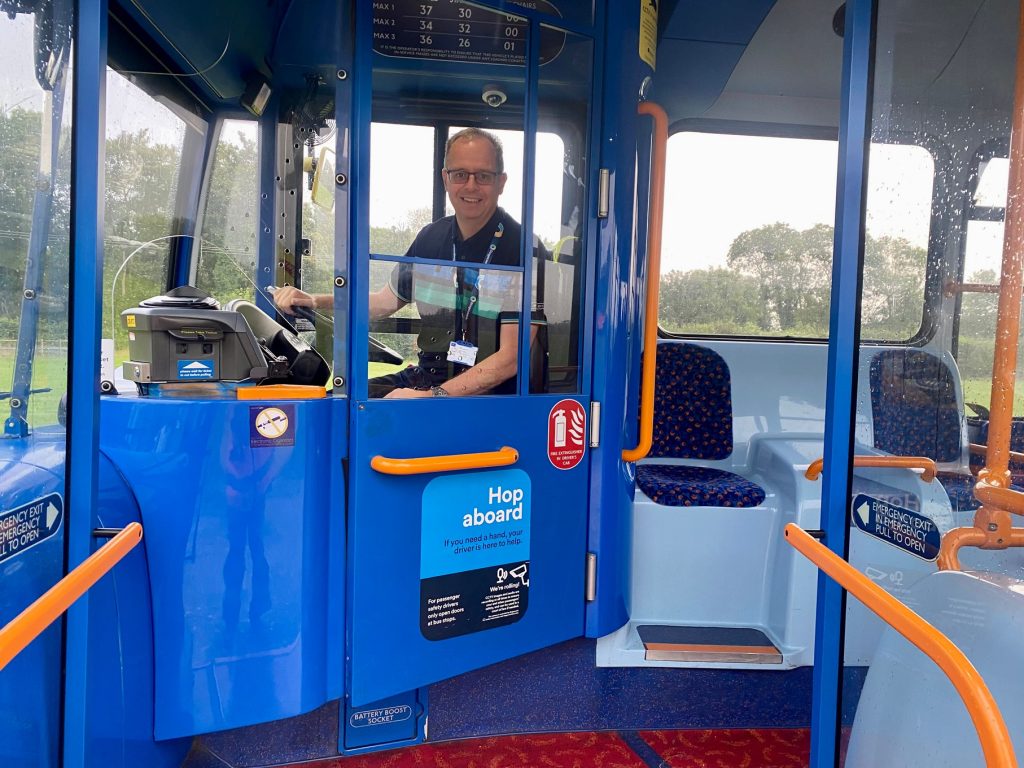
Watch, wait and learn
Running alongside partnership activity is the move to deliver more EV networks as part of the aforementioned Stagecoach decarbonisation strategy.
“I mentioned the need for flexibility,” says Marc. “EV transition requires space, and some of our existing depots don’t have that. We have a couple of schemes in progress, and of course we were early adopters with nine EVs deployed in 2019 at our Guildford depot. Not taking a ‘big bang’ approach gives us time to watch, wait and learn. Some of our routes may not be suitable for EV conversion, so is a hydrogen fuel cell the answer?
“Do we wait for more advanced battery technology? If we need to move to a brownfield site, what does that mean for the efficiency of operation? To me, partnerships that lead to improved bus priority are just as important as decarbonisation. What we don’t want is an area with all buses being zero emission but still sat in the same traffic, with no priority.”
Student recruitment
Mark explains that Stagecoach has taken a new approach to driver recruitment.
“In Portsmouth, and elsewhere, we’re actively recruiting students,” he says. “They’re happy to do the late turns and weekend work that other drivers may not want to. We have some media students whose knowledge of TikTok and other social media platforms is assisting us in producing our recruitment campaigns. In general, the days of having a fixed duty rota and structure have long gone. We try and match what a driver wants to do with what we need.”
Looking ahead, Marc is clear that the bus has an important role to play in life.
“Transport affects us all, usually every single day” he says. “Bus drives economic growth. It’s flexible and it offers excellent value for money compared to many other forms of transport. But the car driver doesn’t always see the value. High car insurance is helping, especially for new, young, drivers, but the government needs to do more. But at the heart of all of this is the importance of customer service. This is fundamental to attracting and retaining customers and at the same time making our industry an enjoyable place to work in, for drivers, engineers and all our staff.”
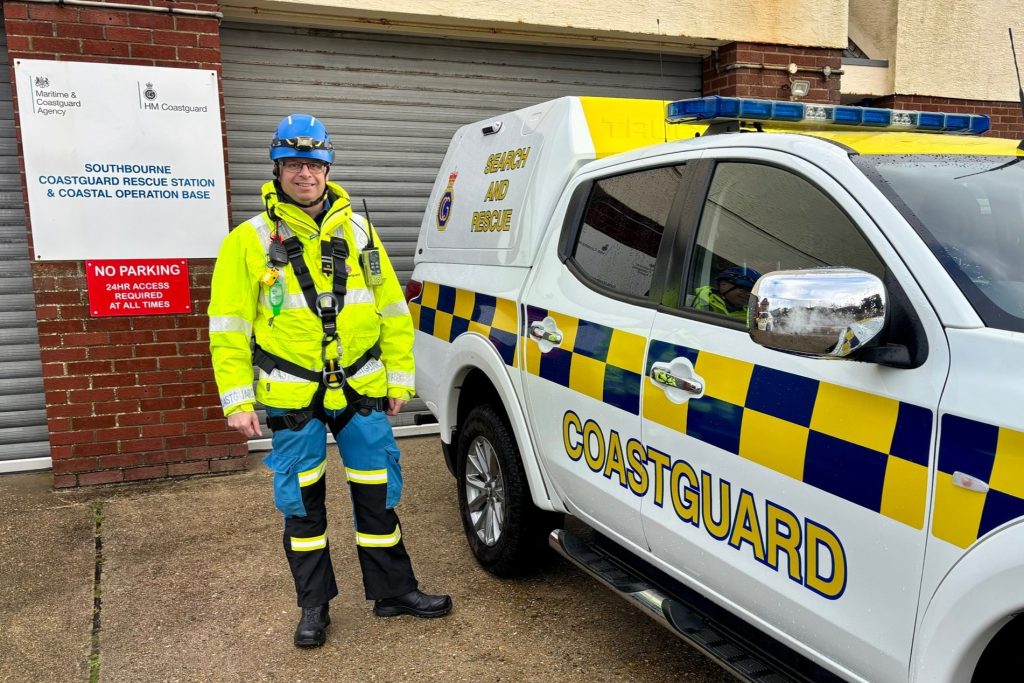
Stress relief
But here’s something you may not know. Marc’s life isn’t just about buses. He’s also Deputy Station Officer at Southbourne in Bournemouth with HM Coastguard.
“It’s a voluntary job I’ve been doing for 14 years,” he says. “I have a team of 12 and this year we’ve been called out to more than 190 taskings, with incidents ranging from rescuing people off treacherous cliffs, to searching for missing people, at all times of the day and night. Why do I do it? I enjoy it and it means I’m putting something back into the community. It’s also, in a funny way, stress relief. And you know what, you couldn’t do it without being part of a team. One might even say it’s a partnership. And as we know, partnerships matter!”




















